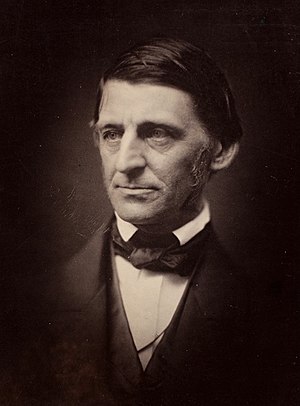
Nature is a language and every new fact one learns is a new word; but it is not a language taken to pieces and dead in the dictionary, but the language put together into a most significant and universal sense. I wish to learn this language--not that I may know a new grammar, but that I may read the great book which is written in that tongue.
Share this quote:
She shows us only surfaces but Nature is a million fathoms deep.
Share this quote:
Nature is a mutable cloud which is always and never the same
Share this quote:
Have mountains, and waves, and skies, no significance but what we consciously give them, when we employ them as emblems of our thoughts?
Share this quote:
To speak truly, few adult persons can see nature. Most persons do not see the sun. At least they have a very superficial seeing. The sun illuminates only the eye of the man, but shines into the eye and the heart of the child. The lover of nature is he whose inward and outward senses are still truly adjusted to each other; who has retained the spirit of infancy even into the era of manhood. His intercourse with heaven and earth, becomes part of his daily food. In the presence of nature, a wild delight runs through the man, in spite of real sorrows.
Share this quote:
Language is fossil poetry
Share this quote:
Over the inter glaciers,I see the summer glow,And, through the wild-piled snowdrift,The warm rosebuds below.
Share this quote:
There is a property in the horizon which no man has but he whose eye can integrate all parts, that is, the poet.
Share this quote:
A friend may well be reckoned the masterpiece of nature.
Share this quote:
We are like travelers using the cinders of a volcano to roast their eggs.
Share this quote:
Peace cannot be achieved through violence, it can only be attained through understanding.
Share this quote:
Nothing can bring you peace but yourself.
Share this quote:
The god of Victory is said to be one-handed, but Peace gives victory to both sides.
Share this quote:
Does not… the ear of Handel predict the witchcraft of harmonic sound?
Share this quote:
Money often costs too much
Share this quote:
The virtues are economists, but some of the vices are also...Pride is handsome, economical; pride eradicates so many vices, letting none subsist but itself, that it seems as if it were a great gain to exchange vanity for pride. Pride can go without domestics, without fine clothes, can live in a house with two rooms, can eat potato, purslain, beans, lyed corn, can work on the soil, can travel afoot, can talk with poor men, or sit silent well contented in fine saloons. But vanity costs money, labor, horses, men, women, health and peace, and is still nothing at last; a long way leading nowhere. Only one drawback; proud people are intolerably selfish, and the vain are gentle and giving.
Share this quote:
Money is representative, and follows the nature and fortunes of the owner...The farmer is covetous of his dollar, and with reason. It is no waif to him. He knows how many strokes of labor it represents. His bones ache with the days work that earned it. He knows how much land it represents - how much rain, frost and sunshine. He knows that, in the dollar, he gives you so much discretion and patience, so much hoeing and threshing. Try to lift his dollar; you must lift all that weight. In the city, where money follows the skit of a pen or a lucky rise in exchange, it comes to be looked on as light.
Share this quote:
Nothing is at last sacred but the integrity of your own mind.
Share this quote:
Nothing is at last sacred but the integrity of our own mind.
Share this quote:
Do the thing and you will have the power.
Share this quote: